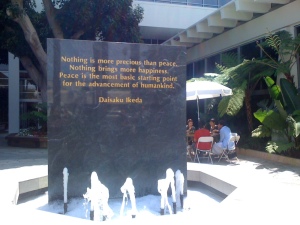As I have often mentioned before, it is said that,
where there is unseen virtue, there will be visible reward.
~Nichiren
Despite mainstream portrayals to the contrary, some people live lives that are not wholly centered around little plastic rectangles. They may operate in cash, or favors, or may require little in the way of strict identification for one reason or another.
I, on the other hand, am one of those beholden to plastic rectangles. For better or for worse, many of my most important transactions are facilitated via these objects and their imprinted numbers, letters, and/or photos. So when I found a wallet bulging with these Rectangles of Life, my next steps were easy.
Those of us whose lives are married to those plastic rectangles know the frustration, and, depending on your line of work or primary mode of transportation, the near paralysis that comes when any of these little bits of matter become compromised. Whether they are lost, stolen, or sucked in to the ATM abyss, it’s not too far afield of tragic. I’ve dealt with this, albeit on a very small scale, only a couple of times. Once, someone hijacked my debit number and went on a shopping spree. I had to cancel my card and order a new one. Before that, an overseas ATM decided I must be a criminal rather than simply barely literate in the host country’s language. It kept my ATM for my own protection.
So that brings us to this afternoon. I settle in at the gatehouse, awaiting my flight. I choose a spot a few seats away from a man, and continued a phone call in progress.
Within a few minutes, it’s time to board. I gather my things and notice a wallet where the man used to be. I look around, guarding it, wondering if he’d touch his pockets and realize they’re a bit lighter. No such luck. Sneaking a peek at his ID, I don’t recognize his face in the swelling crowd.
I present the wallet to the gate agents. Nearby passengers tap their pockets and breathe sighs of relief. Their plastic rectangles are still in tact! One agent summons Scott, who appears from the crowd, not too far from where we’d been sitting.
The other agent decides to give Scott a hard time. She requests that he show his ID. Good-natured Scott pats his pockets and fumbles with zippers on his carry-on. Obviously unable to produce it quickly, she stops the charade, “How about I show YOU your ID?” She hands him his wallet and he sort of laughs, a dazed, or maybe grateful look in his eyes. “Where did you find it?”
They point to me as the person who retrieved it. Nearby passengers marvel, “Oh there are still nice people in the world! Thanks for that!”
Turns out Scott, handsome, yet also married, has trouble with wallets. He’s lost one before. Some way or another it went for a swim while he was boating with friends. “It took me six months to get my life together after that. I can’t believe I almost lost it again. I owe you.”
The least he could do, he said, was trade seats.
And that’s how I ended up in first class today. 🙂

